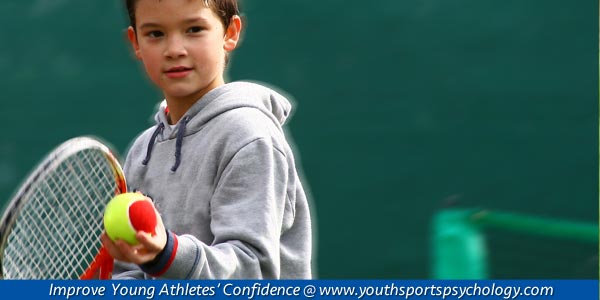Perfectionism in Sports Hurts Confidence
For example, perfectionist athletes expect a lot from their performance. Some of their expectations are unrealistic and make them think too much about results. This can lead to self-doubt when they don’t perform up to these high demands.
Perfectionists also have a hard time feeling confident in both practice and competition. They usually get frustrated with themselves when they don’t live up to their expectations. In addition, perfectionists often want approval from others.
They want to be accepted by fellow teammates, coaches, and friends. And if a teammate or coach give them constructive feedback, their confidence deflates.
Here’s the good news about perfectionist athletes:
Perfectionists are very motivated, have a strong work ethic, are committed to their goals, and have a desire to learn and improve.
A practice mindset is usually the perfectionist’s strength. In addition, coaches love to work with these types of athletes because they usually work very hard and want to improve.
But here’s the bad news:
Perfectionists:
- Lose confidence quickly when not performing well
- Expect to perform without making mistakes
- Are highly judgmental about their performance
- Focus too much on mistakes
- Are always trying to fix their technique, which interferes with trust in competition
What’s the solution?
The answer is not easy. Many of the young athletes we work with fit into the category of perfectionists. We understand the challenges, but perfectionist athletes do not.
The first step is to help athletes uncover the beliefs that underlie perfectionism (and keep them stuck). It’s also important to help them understand how perfectionism might hurt their confidence.
For example, we find that athletes often believe they must be perfect to perform well:
“I should demand high expectations of myself because I work so hard to achieve my goals.”
OR
“The best way to perform perfectly is to avoid making any mistakes.”
As you can see, these beliefs do not help athletes perform their best.
Here’s the process then:
- Help young athletes understand the how perfectionism can be helpful and how it can hurt their performance.
- Discuss the beliefs and behaviors that support perfectionism (“I have to perform perfectly”).
- Help young athletes accept that mistakes are okay.
- Teach young athletes how to focus on working hard instead of performing perfectly.
Here’s an example of number 3 above:
“If I make a mistake, I will keep playing hard. I won’t let a few mistakes hurt my confidence.”
If you enjoy our mental game tips, please share this article to other sports parents and coaches who might appreciate them.
Related Articles on Kids’ Mental Game:
- Helping Young Athletes Kick Perfectionism and Fear of Failure
- Helping Kids See the Good and Bad of Perfectionism in Sports
- How To Free Sports Kids From The Bonds of Perfectionism
*Subscribe to The Sports Psychology Podcast on iTunes
*Subscribe to The Sports Psychology Podcast on Spotify
Improve Your Mental Game From Anywhere In The World

We’re certain that, as a parent, you want to help your child develop confidence and discipline in sports and life. And as a sports parent, you’d love for your children to reach their potential in sports. But encouraging your child to strive for greatness without pressuring them can be a challenge.
You can get expert mental coaching with us from anywhere. Meet with us via Zoom, Skype, FaceTime or phone call. With today’s video technology, we are able to connect with athletes and coaches all over the globe.
Call Us Today to Schedule Your Free 15-Minute Session.
Find Out How Your Athlete Can Benefit From One-on-One Mental Coaching!

